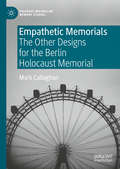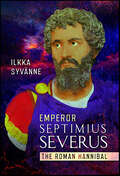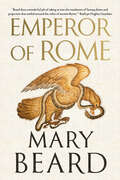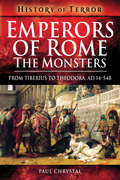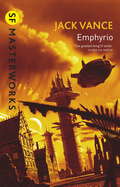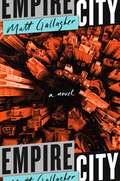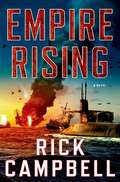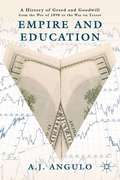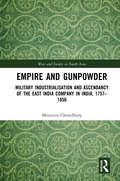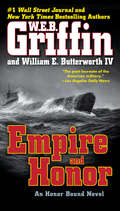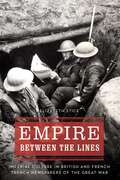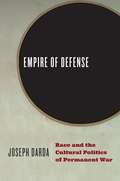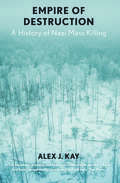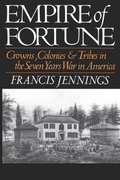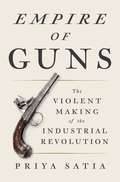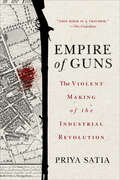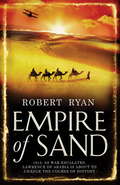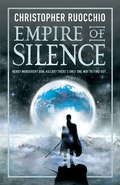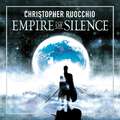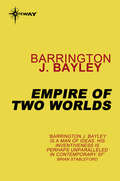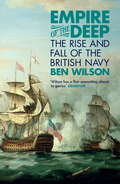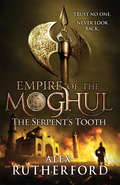- Table View
- List View
Empathetic Memorials: The Other Designs for the Berlin Holocaust Memorial (Palgrave Macmillan Memory Studies)
by Mark CallaghanThis book is a study of the Berlin Holocaust Memorial Competitions of the 1990s, with a focus on designs that kindle empathetic responses. Through analysis of provocative designs, the book engages with issues of empathy, secondary witnessing, and depictions of concentration camp iconography. It explores the relationship between empathy and cultural memory when representations of suffering are notably absent. The book submits that one design represents the idea of an uncanny memorial, and also pays attention to viewer co-authorship in counter-monuments. Analysis of counter-monuments also include their creative engagement with German history and their determination to defy fascist aesthetics. As the winning design for The Memorial to the Murdered Jews of Europe is abstract with an information centre, there is an exploration of the memorial museum. Callaghan asks whether this configuration is intended to compensate for the abstract memorial’s ambiguity or to complement the design’s visceral potential. Other debates explored concern political memory, national memory, and the controversy of dedicating the memorial exclusively to murdered Jews.
Emperor Septimius Severus: The Roman Hannibal
by Ilkka SyvänneOne ancient source called Severus the most warlike of all men who had lived up to that moment in time. The rise of Septimius Severus to power started the dominance of the military in Roman affairs and it was because of this that Septimius’s advice for his sons was nothing less than: 'Be harmonious, enrich the soldiers, and scorn all other men!' Ilkka Syvanne explains in detail how the African Septimius Severus achieved his position, how he won his wars and battles and how he used his newly gained power to secure his family’s position. He reveals how he reformed the state and its military, and how he used these remodeled forces in wars of conquest to prove his worth as emperor to both the soldiers and the populace. This biography offers the first complete overview of the policies, events and military campaigns of Severus' reign in the fullest detail allowed by the sources. It also explains how and why these contributed to the military crisis of the third century and discusses the legacy he left for his son, Caracalla, who followed him in both his good and bad traits.
Emperor of Rome: Ruling The Ancient Roman World
by Mary BeardINSTANT NEW YORK TIMES BESTSELLER Best Books of 2023: New Yorker, The Economist, Smithsonian Most Anticipated Books of Fall: Washington Post, Los Angeles Times, TODAY, Literary Hub, and Publishers Weekly "A vivid way to re-examine what we know, and don’t, about life at the top.... Emperor of Rome is a masterly group portrait, an invitation to think skeptically but not contemptuously of a familiar civilization." —Kyle Harper, Wall Street Journal A sweeping account of the social and political world of the Roman emperors by “the world’s most famous classicist” (Guardian). In her international bestseller SPQR, Mary Beard told the thousand-year story of ancient Rome, from its slightly shabby Iron Age origins to its reign as the undisputed hegemon of the Mediterranean. Now, drawing on more than thirty years of teaching and writing about Roman history, Beard turns to the emperors who ruled the Roman Empire, beginning with Julius Caesar (assassinated 44 BCE) and taking us through the nearly three centuries—and some thirty emperors—that separate him from the boy-king Alexander Severus (assassinated 235 CE). Yet Emperor of Rome is not your typical chronological account of Roman rulers, one emperor after another: the mad Caligula, the monster Nero, the philosopher Marcus Aurelius. Instead, Beard asks different, often larger and more probing questions: What power did emperors actually have? Was the Roman palace really so bloodstained? What kind of jokes did Augustus tell? And for that matter, what really happened, for example, between the emperor Hadrian and his beloved Antinous? Effortlessly combining the epic with the quotidian, Beard tracks the emperor down at home, at the races, on his travels, even on his way to heaven. Along the way, Beard explores Roman fictions of imperial power, overturning many of the assumptions that we hold as gospel, not the least of them the perception that emperors one and all were orchestrators of extreme brutality and cruelty. Here Beard introduces us to the emperor’s wives and lovers, rivals and slaves, court jesters and soldiers, and the ordinary people who pressed begging letters into his hand—whose chamber pot disputes were adjudicated by Augustus, and whose budgets were approved by Vespasian, himself the son of a tax collector. With its finely nuanced portrayal of sex, class, and politics, Emperor of Rome goes directly to the heart of Roman fantasies (and our own) about what it was to be Roman at its richest, most luxurious, most extreme, most powerful, and most deadly, offering an account of Roman history as it has never been presented before.
Emperors of Rome: From Tiberius to Theodora, AD 14–548 (History of Terror)
by Paul ChrystalAs with everything else, there were good and bad Roman emperors. The good, like Trajan (98117), Hadrian (117138), Antoninus Pius (138161) and Marcus Aurelius (161180) were largely civilized and civilizing. The bad, on the other hand, were sometimes nothing less than monsters, exhibiting varying degrees of corruption, cruelty, depravity and insanity. It is a sobering thought that these ogres were responsible for governing the greatest civilization in the world, simultaneously terrorizing, brutalizing and massacring. Tiberius, Caligula, Nero, Domitian, Commodus, Caracella, Elagabalus, Septimius Severus, Diocletian, Maximinus Thrax, Justinian and Theodora all had more bad days than good; they are all covered in this book.Their exploits have, of course, been well documented since classical times but much of the coverage can only be called gratuitous, sensationalist or tabloid. This book is different because it is based on primary sources and evidence and attempts to balance out the shocking with any mitigating aspects in each of their lives. Many of our monsters have some redeeming factors and it is important that these are exposed if a true record of their lives is to be conveyed. The book also examines how each of the twelve has been treated for posterity in literature, theatre and film, and the lessons intended to be drawn from popular culture through the ages.
Emphyrio (S.F. MASTERWORKS)
by Jack VanceFar in the future, the craftsmen of the distant planet Halma create goods which are the wonder of the galaxy. But they know little of this. Their society is harshly regimented, its religion austere and unforgiving, and primitive - to maintain standards, even the most basic use of automation is punishable by death. When Amiante, a wood-carver, is executed for processing old documents with a camera, his son Ghyl rebels, and decides to bring down the system. To do so, he must first interpret the story of Emphyrio, an ancient hero of Halman legend.All Jack Vance titles in the SF Gateway use the author's preferred texts, as restored for the Vance Integral Edition (VIE), an extensive project masterminded by an international online community of Vance's admirers. In general, we also use the VIE titles, and have adopted the arrangement of short story collections to eliminate overlaps.
Empire City: A Novel
by Matt Gallagher&“Empire City is a dark, nimble book that pulls no punches. While the novel tracks an alternate historical reality, time and again I found myself taken aback at just how prescient and applicable its insight is to our very real present. Gallagher once again establishes himself as a preeminent voice in American writing.&” —Sara Novic, award-winning author of Girl at War &“A brilliant and daring novel. Gallagher&’s prose is sharp, energetic and witty, his characters are fiercely alive, and the cracked vision of America he creates is a monstrous thing of beauty.&” —Phil Klay, award-winning author of Redeployment The author of the &“urgent and deeply moving&” (The New York Times) Youngblood returns with this bold and provocative novel following a group of super-powered soldiers and civilians as they navigate an imperial America on the precipice of a major upheaval—for fans of The Fortress of Solitude and The Plot Against America. Thirty years after its great triumph in Vietnam, the United States has again become mired in an endless foreign war overseas. Stories of super soldiers known as the Volunteers tuck in little American boys and girls every night. Yet domestic politics are aflame. Violent protests erupt throughout the nation; an ex-military watchdog group clashes with police while radical terrorists threaten to expose government experiments within the veteran rehabilitation colonies. Halfway between war and peace, the Volunteers find themselves waiting for orders in the vast American city-state, Empire City. There they encounter a small group of civilians who know the truth about their powers, including Sebastian Rios, a young bureaucrat wrestling with survivor guilt, and Mia Tucker, a wounded army pilot-turned-Wall Street banker. Meanwhile, Jean-Jacques Saint-Preux, a Haitian-American Volunteer from the International Legion, decides he&’ll do whatever it takes to return to the front lines. Through it all, a controversial retired general emerges as a frontrunner in the presidential campaign, promising to save the country from itself. Her election would mean unprecedented military control over the country, with promises of security and stability—but at what cost? Featuring Gallagher&’s &“vital&” (The Washington Post), &“evocative&” (The Wall Street Journal) prose, Empire City is a rousing vision of an alternate—yet all too familiar—America on the brink.
Empire Rising (Trident Deception #2)
by Rick CampbellAfter a long, secret military buildup, China launches a swift and deadly attack on Taiwan. But that's only their first move in a much deadlier game. In Rick Campbell's thrillingEmpire Rising,Xiang Chenglei, Chinese president and party secretary, has both a problem and a plan. The problem is that China's limited supply of oil is threatening to derail its economic growth and prosperity. Having failed to win access to a greater supply diplomatically, he sets his backup plan in motion. And what is war, but diplomacy by other means? The U. S. Pacific Fleet is the major military force in the area, and when Taiwan is invaded, the fleet is sent in to repel the invading Chinese forces. The U. S. military expects it to be an easy operation, but after a decades-long, top-secret buildup, China has military capabilities far greater than the United States is aware of. With hidden batteries of long range missiles, advanced cyber warfare capabilities, and a submarine fleet wielding a secret weapon, China is able to overwhelm the American fleet. In fact, China all but wipes out the U. S. Pacific Fleet--leaving them free to turn to their real objective--invasion and expansion across Asia, starting with the four main islands of Japan. While the Atlantic Fleet surges westward to defend its allies and respond to the destruction of their counterparts, it falls to an unlikely alliance of three people to stop this incursion and prevent an all-but-inevitable global war. National Security Advisor Christine O'Connor has critical information, but she's trapped in Beijing; Captain Murray Wilson, commanding officer of the submarine USS Michigan must somehow infiltrate the Chinese submarine blockade; and Navy SEAL Jake Harrison must lead a strike team into the most hostile of territories with only hours to implement the most daring plan ever.
Empire and Education
by A. J. AnguloThis book is about education and American imperialism from the War of 1898 to the War on Terror. Very little coordinated or sustained research has been devoted to the broader contours of America, education, and empire. And third, this volume seeks to inspire new directions in the study of American educational history.
Empire and Gunpowder: Military Industrialisation and Ascendancy of the East India Company in India, 1757–1856 (War and Society in South Asia)
by Moumita ChowdhuryThis book focuses on the relation between technology, warfare and state in South Asia in the eighteenth and the nineteenth centuries. It explores how gunpowder and artillery played a pivotal role in the military ascendancy of the East India Company in India. The monograph argues that the contemporary Indian military landscape was extremely dynamic, with contemporary indigenous polities (Mysore, the Maratha Confederacy and the Khalsa Kingdom) attempting to transform their military systems by modelling their armies on European lines. It shows how the Company established an edge through an efficient bureaucracy and a standardised manufacturing system, while the Indian powers primarily focused on continuous innovation and failed to introduce standardisation of production. Drawing on archival records from India and the UK, this volume makes a significant intervention in our understanding of the rise of the British Empire in South Asia. It will be of great interest to scholars and researchers of history, especially military history, military and strategic studies and South Asian studies.
Empire and Honor (Honor Bound #6)
by William E. Butterworth W.E.B. GriffinOctober 1945. The war is over. The OSS has been disbanded. But for Cletus Frade and his colleagues in the OSS, the fight goes on... In the closing months of the war, the United States made a secret deal with Reinhard Gehlen, head of German intelligence's Soviet section. In exchange for a treasure trove of intelligence on the Soviets and their spies within the U.S. atomic bomb program, Gehlen's people would be spirited to safety in Argentina.Only a handful of people know about the deal. If word got out, all hell would break loose--and the U.S. would lose some of the most valuable intelligence sources they possess. It is up to Frade and company to keep them safe.But some people have other ideas...
Empire between the Lines: Imperial Culture in British and French Trench Newspapers of the Great War (Studies in War, Society, and the Military)
by Elizabeth SticeAlthough the Great War was sparked and fueled by nationalism, it was ultimately a struggle between empires. The shots fired in Sarajevo mobilized citizens and subjects across far-flung continents that were connected by European empires. This imperial experience of the Great War influenced European soldiers&’ ideas about the conflict, leading them to reimagine empires and their places with them and eventually reshaping imperial cultures. In Empire between the Lines Elizabeth Stice analyzes stories, poetry, plays, and cartoons in British and French trench newspapers to demonstrate how British and French soldiers experienced and envisioned empires through the war and the war through empire. By establishing the imperial context for European soldiers and exploring representations of colonial troops, depictions of non-European campaigns, and descriptions of the German enemy, Stice argues that while certain narratives from prewar imperial culture persisted, the experience of the war also created new, competing narratives about empire and colonized peoples.Empire between the Lines is the first study of its kind to consult British and French newspapers together, offering an innovative lens for viewing the public discourse of the trenches. By interrogating the relationship between British and French soldiers and empire during the war, Stice increases our understanding of the worldview of ordinary men in extraordinary times.
Empire of Chance
by Anders Engberg-PedersenAnders Engberg-Pedersen shows how the Napoleonic Wars inspired a new discourse on knowledge in the West. Soldiers returning from battle were forced to reconsider what it is possible to know and how decisions are made in a fog of imperfect knowledge. Chance no longer appeared exceptional but normative--a prism for understanding the modern world.
Empire of Defense: Race and the Cultural Politics of Permanent War
by Joseph DardaEmpire of Defense is an extensive and multilayered critique of the past seventy years of American military engagement. Joseph Darda exposes how the post–World War II formation of the Department of Defense and the subsequent Korean War set a course for decades of permanent conflict. Conflict, which the United States, he argues, ingeniously reframed as the defense of humanity from illiberal beliefs and behaviors. Empire of Defense shows how a string of rationales for war from the 1940s to the present—anticommunism, crime control, humanitarianism, and counterterrorism—paved the way for unprecedented military growth that secured rather than dismantled the existing racial order. A wide range of writers, filmmakers, and journalists—from I. F. Stone and Ishmael Reed to Stanley Kubrick and June Jordan—have struggled to tell the story of war without end, and Darda reveals how that struggle itself tells the bigger story. He draws a clear line from the Cold War to the war on terror and makes sense of our collective cultural efforts to recognize the not-so-new normal of nonstop military empire-building.
Empire of Destruction: A History of Nazi Mass Killing
by Alex J. KayThe first comparative, comprehensive history of Nazi mass killing – showing how genocidal policies were crucial to the regime&’s strategy to win the war Nazi Germany killed approximately 13 million civilians and other non-combatants in deliberate policies of mass murder, mostly during the war years. Almost half the victims were Jewish, systematically destroyed in the Holocaust, the core of the Nazis&’ pan-European racial purification programme. Alex Kay argues that the genocide of European Jewry can be examined in the wider context of Nazi mass killing. For the first time, Empire of Destruction considers Europe&’s Jews alongside all the other major victim groups: captive Red Army soldiers, the Soviet urban population, unarmed civilian victims of preventive terror and reprisals, the mentally and physically disabled, the European Roma and the Polish intelligentsia. Kay shows how each of these groups was regarded by the Nazi regime as a potential threat to Germany&’s ability to successfully wage a war for hegemony in Europe. Combining the full quantitative scale of the killings with the individual horror, this is a vital and groundbreaking work.
Empire of Fortune: Crowns, Colonies, and Tribes in the Seven Years War in America
by Francis JenningsEmpire of Fortune focuses on the so-called "French and Indian War"--the bitter last-ditch struggle between the British and the French empires in the New World. Challenging traditional historians, Francis Jennings reveals in absorbing detail the political and military realities behind the myths.
Empire of Guns: The Violent Making of the Industrial Revolution
by Priya SatiaBy a prize-winning young historian, an authoritative work that reframes the Industrial Revolution, the expansion of British empire, and emergence of industrial capitalism by presenting them as inextricable from the gun trade"A fascinating and important glimpse into how violence fueled the industrial revolution, Priya Satia's book stuns with deep scholarship and sparkling prose."--Siddhartha Mukherjee, Pulitzer Prize-winning author of The Emperor of All Maladies We have long understood the Industrial Revolution as a triumphant story of innovation and technology. Empire of Guns, a rich and ambitious new book by award-winning historian Priya Satia, upends this conventional wisdom by placing war and Britain's prosperous gun trade at the heart of the Industrial Revolution and the state's imperial expansion.Satia brings to life this bustling industrial society with the story of a scandal: Samuel Galton of Birmingham, one of Britain's most prominent gunmakers, has been condemned by his fellow Quakers, who argue that his profession violates the society's pacifist principles. In his fervent self-defense, Galton argues that the state's heavy reliance on industry for all of its war needs means that every member of the British industrial economy is implicated in Britain's near-constant state of war. Empire of Guns uses the story of Galton and the gun trade, from Birmingham to the outermost edges of the British empire, to illuminate the nation's emergence as a global superpower, the roots of the state's role in economic development, and the origins of our era's debates about gun control and the "military-industrial complex" -- that thorny partnership of government, the economy, and the military. Through Satia's eyes, we acquire a radically new understanding of this critical historical moment and all that followed from it. Sweeping in its scope and entirely original in its approach, Empire of Guns is a masterful new work of history -- a rigorous historical argument with a human story at its heart.
Empire of Guns: The Violent Making of the Industrial Revolution
by Priya SatiaA rich and ambitious history reframing the Industrial Revolution, the expansion of the British empire, and the emergence of industrial capitalism as inextricable from the gun trade. From the seventeenth to the nineteenth century, the industrial revolution transformed Britain from an agricultural and artisanal economy to one dominated by industry, ushering in unprecedented growth in technology and trade and putting the country at the center of the global economy. But the commonly accepted story of the industrial revolution, anchored in images of cotton factories and steam engines invented by unfettered geniuses, overlooks the true root of economic and industrial expansion: the lucrative military contracting that enabled the country's near-constant state of war in the eighteenth century. Demand for the guns and other war materiel that allowed British armies, navies, mercenaries, traders, settlers, and adventurers to conquer an immense share of the globe in turn drove the rise of innumerable associated industries, from metalworking to banking. Bookended by the Glorious Revolution of 1688 and the end of the Napoleonic Wars in 1815, this book traces the social and material life of British guns over a century of near-constant war and violence at home and abroad. Priya Satia develops this story through the life of prominent British gun-maker and Quaker Samuel Galton Jr., who was asked to answer for the moral defensibility of producing guns as new uses like anonymous mass violence rose. Reconciling the pacifist tenet of his faith with his perception of the economic realities of the time, Galton argued that war was driving the industrial economy, making everyone inescapably complicit in it. Through his story, Satia illuminates Britain's emergence as a global superpower, the roots of the government's role in economic development, and the origins of our own era's debates over gun control and military contracting.
Empire of Sand (The\great British Heroes And Antiheroes Trilogy Ser. #1)
by Robert RyanA sweeping epic historical novel about Lawrence of Arabia, one of the most compelling characters in British history, from bestselling author Robert Ryan.1915: While the war in Europe escalates, a young intelligence officer named Thomas Edward Lawrence is in Cairo, awaiting his chance for action. His superiors, however, have consigned him to the Map Room at GCHQ. But there’s more to Lieutenant Lawrence than meets the eye. A man of immense energy, he runs a network of agents across the Levant. Lawrence is convinced that an Arab revolt is the only way to remove the Ottoman presence, and leave a free self-governed Arabia. Soon, alarming reports reach him of trouble in Persia, orchestrated by infamous German agent Wilhelm Wassmuss. Intent on taking down Wassmuss and, at the same time, unlocking the secret of his success, Lawrence assembles a small group and travels to Persia...
Empire of Sand (The\great British Heroes And Antiheroes Trilogy Ser. #1)
by Robert RyanA sweeping epic historical novel about Lawrence of Arabia, one of the most compelling characters in British history, from bestselling author Robert Ryan.1915: While the war in Europe escalates, a young intelligence officer named Thomas Edward Lawrence is in Cairo, awaiting his chance for action. His superiors, however, have consigned him to the Map Room at GCHQ. But there’s more to Lieutenant Lawrence than meets the eye. A man of immense energy, he runs a network of agents across the Levant. Lawrence is convinced that an Arab revolt is the only way to remove the Ottoman presence, and leave a free self-governed Arabia. Soon, alarming reports reach him of trouble in Persia, orchestrated by infamous German agent Wilhelm Wassmuss. Intent on taking down Wassmuss and, at the same time, unlocking the secret of his success, Lawrence assembles a small group and travels to Persia...
Empire of Silence: Book One (Sun Eater)
by Christopher RuocchioHadrian Marlowe, a man revered as a hero and despised as a murderer, chronicles his tale in the galaxy-spanning debut of the Sun Eater series, merging the best of space opera and epic fantasy.It was not his war.On the wrong planet, at the right time, for the best reasons, Hadrian Marlowe started down a path that could only end in fire. The galaxy remembers him as a hero: the man who burned every last alien Cielcin from the sky. They remember him as a monster: the devil who destroyed a sun, casually annihilating four billion human lives--even the Emperor himself--against Imperial orders.But Hadrian was not a hero. He was not a monster. He was not even a soldier.Fleeing his father and a future as a torturer, Hadrian finds himself stranded on a strange, backwater world. Forced to fight as a gladiator and navigate the intrigues of a foreign planetary court, he will find himself fighting a war he did not start, for an Empire he does not love, against an enemy he will never understand.
Empire of Silence: Book One (Sun Eater)
by Christopher RuocchioEMPIRE OF SILENCE is a totally original SF read, perhaps most easily described as an SFnal Name of the Wind in concept. Hadrian Marlowe, privileged first son of a Duke was destined for greatness, and he has become a legend. The Sun-Slayer. The Breaker of Sieges. The Crusher of Civilisations. His is a story which defined the course of worlds.This novel is not that story - not the only laid out in the history books, charting the 300 years of his life. Rather this is Hadrian's story, told in his own worlds. Of being passed over by his father for rule in favour of his younger brother, and sent to a military academy against his wishes. Of being kidnapped in transit to that planet and sold into slavery on a planet at the edge of our war against the Cielcen . . . and of how he used their eventual attack to claw his way back into the dangers and opportunities of politics.Focused on a single character, this is accessible low-SFnal adventure where the emphasis is on character motivation, relationships and politics - whether those characters are aristocrats, slaves or aliens - placing it in the tradition of Dune or even Star Wars and giving us a wider potential market than we might usually have for an SF novel (absolutely no science being involved).Read by John Lee(p) Orion Publishing Group 2018
Empire of Two Worlds
by Barrington J. BayleyIn the huge termite-hills of cities that dotted the dead world of Killibol it seemed that nothing could ever change. Each city was enclosed and self-sustaining, in a stasis fixed by the one reality of power: the protein tanks in which organic nutrients could be processed to provide food.But gang-leader Becmath was a man with a vision: to build an empire for himself without breaking this stasis. His lieutenant Klein recognised Becmath's genius and stayed faithful to him even when they were forced to travel Killibol's arid surface in a desperate search for the lost gateway to Earth. He stayed faithful through murder, treachery and countless adventures. Only when Becmath's schemes reached incredible fulfilment was he able to realise that he had been serving an egomaniac and a monster . . .
Empire of the Deep: The Rise and Fall of the British Navy
by Ben WilsonThe bestselling complete history of the British Navy - our national story through a different prism.The story of our navy is nothing less than the story of Britain, our culture and our empire. Much more than a parade of admirals and their battles, this is the story of how an insignificant island nation conquered the world's oceans to become its greatest trading empire. Yet, as Ben Wilson shows, there was nothing inevitable about this rise to maritime domination, nor was it ever an easy path. EMPIRE OF THE DEEP: THE RISE AND FALL OF THE BRITISH NAVY also reveals how our naval history has shaped us in more subtle and surprising ways - our language, culture, politics and national character all owe a great debt to this conquest of the seas. This is a gripping, fresh take on our national story.
Empire of the Deep: The Rise and Fall of the British Navy
by Ben WilsonThe bestselling complete history of the British Navy - our national story through a different prism.The story of our navy is nothing less than the story of Britain, our culture and our empire. Much more than a parade of admirals and their battles, this is the story of how an insignificant island nation conquered the world's oceans to become its greatest trading empire. Yet, as Ben Wilson shows, there was nothing inevitable about this rise to maritime domination, nor was it ever an easy path. EMPIRE OF THE DEEP: THE RISE AND FALL OF THE BRITISH NAVY also reveals how our naval history has shaped us in more subtle and surprising ways - our language, culture, politics and national character all owe a great debt to this conquest of the seas. This is a gripping, fresh take on our national story.
Empire of the Moghul: The Serpent's Tooth
by Alex Rutherford* MAJOR TV SCREEN ADAPTATION COMING 202O FROM DISNEY+ HOTSTAR *The new Moghul Emperor Shah Jahan reigns over a colossally wealthy empire of 100 million souls. Yet to gain his throne he has followed the savage 'throne or coffin' traditions of his ancestors - descendants of Genghis Khan and Tamburlaine. Ever since the Moghuls took India, brother has fought brother and sons their fathers for the prize and Shah Jahan has been no exception.As his reign dawns, now is the time for Shah Jahan to secure his throne by crushing his enemies. Instead, devastated by the death of his beautiful wife Mumtaz, he becomes obsessed with building an epic monument to their perfect love - the Taj Mahal. His overwhelming grief isolates him from his sons and he does not see the rivalries, indeed hatreds, building between them. When he falls ill, civil war breaks out - ruthless, murderous and uncontrollable - and the foundations of the empire itself begin to shake.
